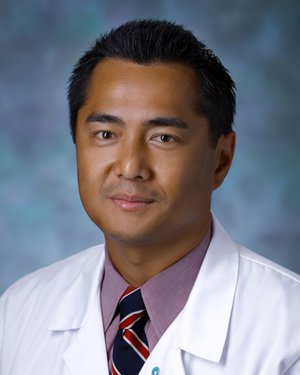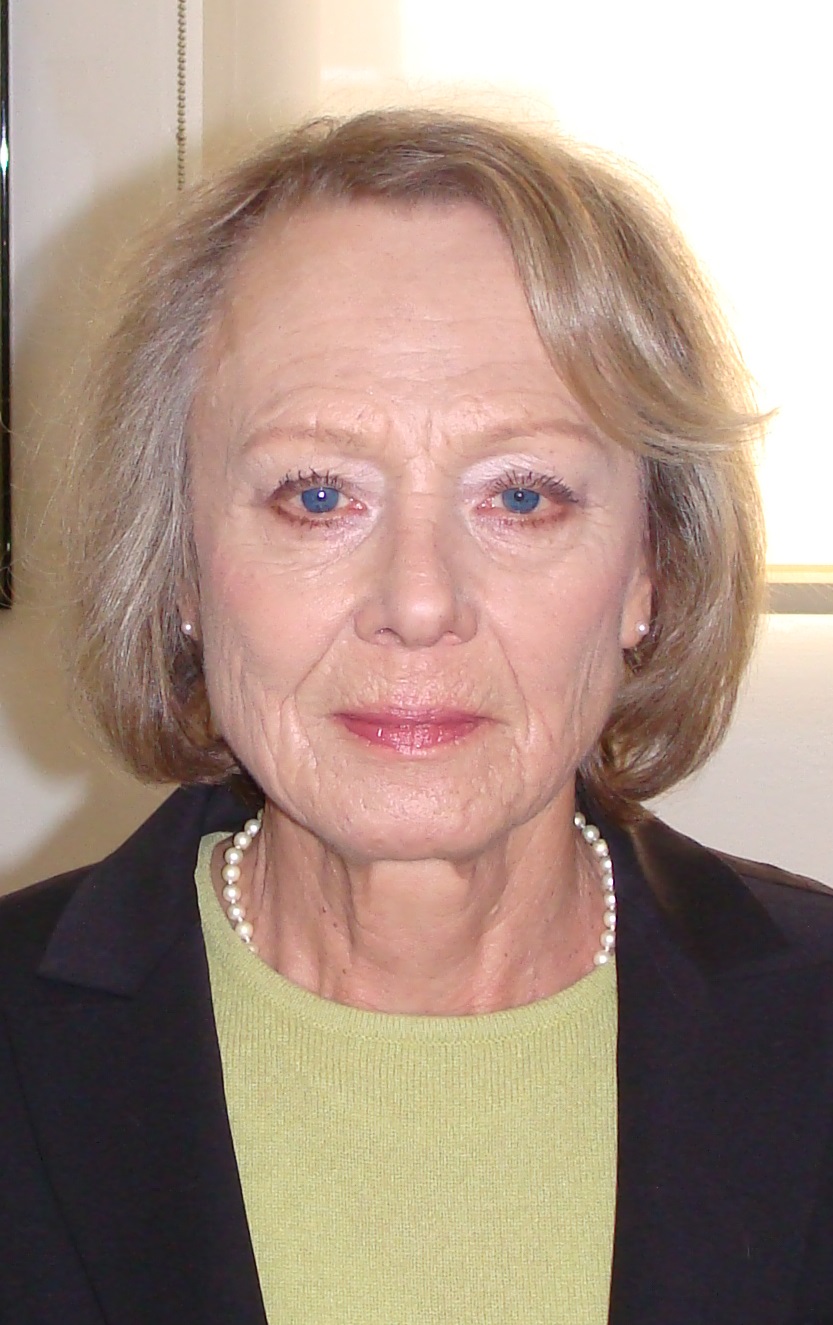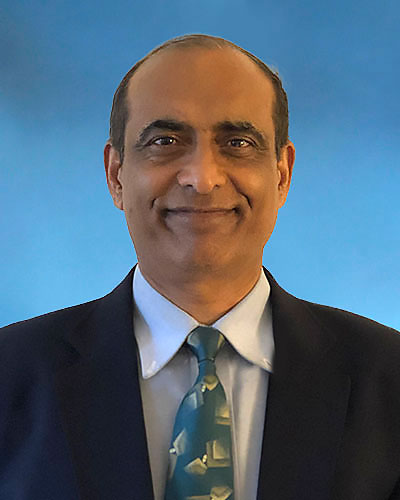Tumor Biology and Radioresistance
Members

Phuoc T. Tran, MD, PhD
Professor
Vice Chair for Research

France Carrier, PhD
Professor
Director, DTRS
Interim TLSS Director
Co-Leader, UMGCCC Program of Molecular & Structural Biology

Elizabeth Balcer-Kubiczek, PhD
Associate Professor

Feyruz V. Rassool, PhD
Professor
Co-director, Experimental Therapeutics Program, UMGCCC

Hem D. Shukla, PhD
Assistant Professor
DNA damage and repair, and its impact on the genetic and epigenetic integrity of the cell in cancer and related diseases, is a key focus of research within our division. Studies are designed to improve understanding of the biological effects of radiation exposure, with the ultimate objective of providing a rational scientific basis to improve radiation therapy for cancer patients. In addition, knowledge of DNA damage and repair in normal and cancer cells will enable the development of novel therapies in cancer.
Principal investigators within DTRS are focused on areas of research ranging from the biochemical processes involved in cellular DNA damage and repair responses, to the abnormal repair pathways in cancer cells. Each of the areas of research considerably strengthen the research in its translation to the clinic and is evidenced by the translational research initiatives launched within the Division. Major themes include, but are not limited to the following:
- Understanding the molecular events underlying cancer progression, with the overall goal of delineating intrinsic differences between normal and cancer cells in order to more specifically target cancer cells and improve current cancer therapies.
- Targeting DNA repair abnormalities in cancer in combination with epigenetic therapy as a novel therapeutic strategy that is being translated into clinical trials in acute myeloid leukemia and is being developed for translation to breast, ovarian, and lung cancers in which PARP expression is abnormally increased.
- Elucidating the role of tumor microenvironments in the proliferation and adaptation of malignant tumor cells, and utilizing this knowledge to prevent or eliminate malignancy by employing various therapeutic interventions, such as radio-, chemo-, immuno-, and thermo-therapies.
Research Highlights
Dr. France Carrier's Lab
Dr. France Carrier’s laboratory is interested in understanding molecular events underlying cancer progression, and to delineate intrinsic differences between normal and cancer cells in order to more specifically target cancer cells and improve current cancer therapies. In particular, Dr. Carrier is investigating the radio-sensitizing effect of enzymes that deacetylate histones ,histone deacylatylase inhibitors (HDACIs) to improve conventional and new radiotherapy treatments for glioblastomas, lymphoma, lung, melanoma and gastrointestinal cancers.Translational research led by Dr. France Carrier has contributed to the development of multiple clinical trials, including:
- Evaluation of the effect of the histone deacetylase inhibitor Vorinostat in combination therapies for patients with relapsed and/or refractory leukemias and myelodysplastic syndromes (led by Douglas Ross, MD, PhD);
- Phase II clinical trial (1224GCC) to evaluate low-dose whole brain radiotherapy with concurrent temozolomide and adjuvant temozolomide in patients with newly diagnosed glioblastoma multiforme (led by Young Kwok, MD, Dept. of Radiation Oncology); and
- Pre-clinical data in support of Michael Chuong, MD, and Shahed Badiyan, MD, for an ongoing phase II trial of low-dose whole-pelvic radiotherapy with concurrent neoadjuvant FOLFOX for patients with newly diagnosed T3N0M0, T2N1M0, T3N1M0 rectal adenocarcinoma (1314GCC) (led by Shahed Badiyan, MD, Dept. of Radiation Oncology).
Other notable accomplishments by researchers within this group include data generated by Dr. Carrier’s group on low-dose fractionated radiation therapy (LDFRT) leading to identification of dual oxidase 2 (DUOX2), an enzyme functioning in the production of hydrogen peroxide, as a major contributor to chemopotentiation by LDFRT. DUOX2 is overexpressed in gastrointestinal cancers and could be used as a biomarker to potentially stratify these patients for clinical applications of chemopotentiation by LDFRT.
Dr. Elizabeth Balcer-Kubiczek’s Lab
Dr. Elizabeth Balcer-Kubiczek’s laboratory is focused on understanding the mechanisms by chemo/radio-therapeutic agents exert their cell killing, at therapeutically relevant doses used in the clinic. In the light of the recent discoveries of hyper-radiosensitivity (HRS) and bystander effects, Dr Balcer-Kubiczek is reevaluating radiodosimetry and the enhancing rather than sparing effects of dose fractionation with high-energy therapeutic radiation doses.
Dr. Feyruz Rassool’s Lab
Dr. Feyruz Rassool's laboratory focuses on the effects of abnormal DNA damage and repair in cancers and leukemias, and how DNA repair is abnormally regulated, resulting in survival, progression and resistance to chemo/radio-therapeutic agents. One focus of her work is the inhibition of abnormal DNA repair in breast cancer and leukemia as a therapeutic strategy. Preclinical data generated by Dr. Feyruz Rassool related to epigenetics and DNA repair pathways will be tested in a phase 1/2 clinical trial in collaboration with Maria Baer, MD, director of Hematologic Malignancies and co-leader of the Experimental Therapeutics Program at the University of Maryland Marlene and Stewart Greenebaum Comprehensive Cancer Center. The research will be funded by the Stand up to Cancer Director of Hematologic malignancies and VA researcher Dr. Maria Baer, that is to be funded by the Stand Up to Cancer Initiative.
Dr. Juong Rhee’s Lab
Dr. Juong Rhee’s laboratory studies tumor physiology with the ultimate goal of developing novel treatments for cancer. The lab is particularly interested in the hypoxic regions of tumors that are nutritionally deficient regions away from a blood supply and tend to be resistant to radiation therapy and most chemotherapeutic agents. The lab is studying the regulation of vascular endothelial growth factor (VEGF), a factor produced by the tumors which includes blood vessel growth, and the regulation of the gene p53 which has many functions in the cell including DNA damage repair and apoptosis (programmed cell death).
Dr. Hem Shukla's lab
Dr. Hem Shukla’s lab is highly focused on translational research employing photon and proton beam therapy employing in vitro and tumor xenograft models. The main focus of the lab’s research is radiation-induced modulation of immuno-suppressive tumor microenvironments employing a combination of immunotherapy, radiation therapy, and hyperthermia in pancreatic, non-small cell lung cancer (NSCLC), and prostate cancer. Currently, the lab is testing a promising anticancer drug in a preclinical model targeting the glucose metabolism of pancreatic tumor cells combined with low doses of radiation. Dr. Shukla’s lab is also involved in investigating tumor derived organoid (TDO) models to understand the responses to chemotherapy combined with radiation therapy, and possible clinical applications. By employing Omics tools, the lab can identify and optimize biomarkers and pathways in NSCLC that are responsible for radiation resistance, and as a result of this research design radiosensitizers to ameliorate radiation treatment response.
